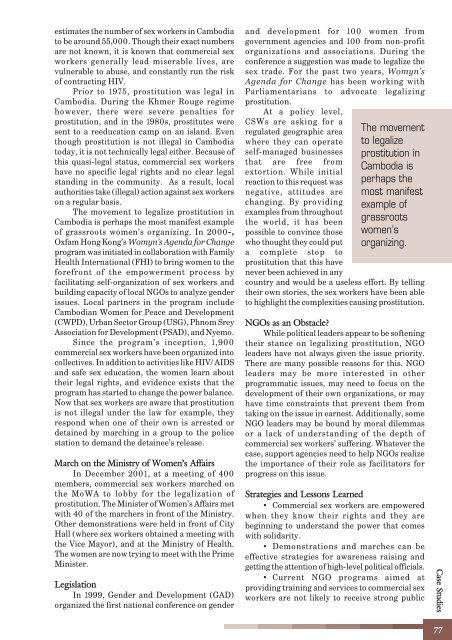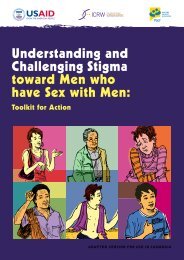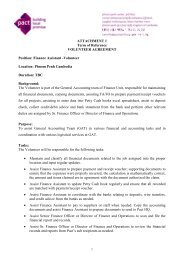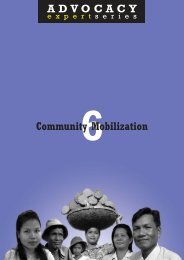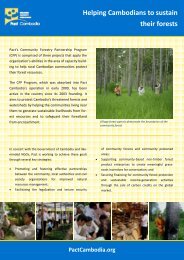Advocacy in Cambodia: Increasing Democratic ... - Pact Cambodia
Advocacy in Cambodia: Increasing Democratic ... - Pact Cambodia
Advocacy in Cambodia: Increasing Democratic ... - Pact Cambodia
Create successful ePaper yourself
Turn your PDF publications into a flip-book with our unique Google optimized e-Paper software.
estimates the number of sex workers <strong>in</strong> <strong>Cambodia</strong><br />
to be around 55,000. Though their exact numbers<br />
are not known, it is known that commercial sex<br />
workers generally lead miserable lives, are<br />
vulnerable to abuse, and constantly run the risk<br />
of contract<strong>in</strong>g HIV.<br />
Prior to 1975, prostitution was legal <strong>in</strong><br />
<strong>Cambodia</strong>. Dur<strong>in</strong>g the Khmer Rouge regime<br />
however, there were severe penalties for<br />
prostitution, and <strong>in</strong> the 1980s, prostitutes were<br />
sent to a reeducation camp on an island. Even<br />
though prostitution is not illegal <strong>in</strong> <strong>Cambodia</strong><br />
today, it is not technically legal either. Because of<br />
this quasi-legal status, commercial sex workers<br />
have no specific legal rights and no clear legal<br />
stand<strong>in</strong>g <strong>in</strong> the community. As a result, local<br />
authorities take (illegal) action aga<strong>in</strong>st sex workers<br />
on a regular basis.<br />
The movement to legalize prostitution <strong>in</strong><br />
<strong>Cambodia</strong> is perhaps the most manifest example<br />
of grassroots women’s organiz<strong>in</strong>g. In 2000-,<br />
Oxfam Hong Kong’s Womyn’s Agenda for Change<br />
program was <strong>in</strong>itiated <strong>in</strong> collaboration with Family<br />
Health International (FHI) to br<strong>in</strong>g women to the<br />
forefront of the empowerment process by<br />
facilitat<strong>in</strong>g self-organization of sex workers and<br />
build<strong>in</strong>g capacity of local NGOs to analyze gender<br />
issues. Local partners <strong>in</strong> the program <strong>in</strong>clude<br />
<strong>Cambodia</strong>n Women for Peace and Development<br />
(CWPD), Urban Sector Group (USG), Phnom Srey<br />
Association for Development (PSAD), and Nyemo.<br />
S<strong>in</strong>ce the program’s <strong>in</strong>ception, 1,900<br />
commercial sex workers have been organized <strong>in</strong>to<br />
collectives. In addition to activities like HIV/AIDS<br />
and safe sex education, the women learn about<br />
their legal rights, and evidence exists that the<br />
program has started to change the power balance.<br />
Now that sex workers are aware that prostitution<br />
is not illegal under the law for example, they<br />
respond when one of their own is arrested or<br />
deta<strong>in</strong>ed by march<strong>in</strong>g <strong>in</strong> a group to the police<br />
station to demand the deta<strong>in</strong>ee’s release.<br />
March on the M<strong>in</strong>istry of Women’s Affairs<br />
In December 2001, at a meet<strong>in</strong>g of 400<br />
members, commercial sex workers marched on<br />
the MoWA to lobby for the legalization of<br />
prostitution. The M<strong>in</strong>ister of Women’s Affairs met<br />
with 40 of the marchers <strong>in</strong> front of the M<strong>in</strong>istry.<br />
Other demonstrations were held <strong>in</strong> front of City<br />
Hall (where sex workers obta<strong>in</strong>ed a meet<strong>in</strong>g with<br />
the Vice Mayor), and at the M<strong>in</strong>istry of Health.<br />
The women are now try<strong>in</strong>g to meet with the Prime<br />
M<strong>in</strong>ister.<br />
Legislation<br />
In 1999, Gender and Development (GAD)<br />
organized the first national conference on gender<br />
and development for 100 women from<br />
government agencies and 100 from non-profit<br />
organizations and associations. Dur<strong>in</strong>g the<br />
conference a suggestion was made to legalize the<br />
sex trade. For the past two years, Womyn’s<br />
Agenda for Change has been work<strong>in</strong>g with<br />
Parliamentarians to advocate legaliz<strong>in</strong>g<br />
prostitution.<br />
At a policy level,<br />
CSWs are ask<strong>in</strong>g for a<br />
regulated geographic area<br />
where they can operate<br />
self-managed bus<strong>in</strong>esses<br />
that are free from<br />
extortion. While <strong>in</strong>itial<br />
reaction to this request was<br />
negative, attitudes are<br />
chang<strong>in</strong>g. By provid<strong>in</strong>g<br />
examples from throughout<br />
the world, it has been<br />
possible to conv<strong>in</strong>ce those<br />
who thought they could put<br />
a complete stop to<br />
prostitution that this have<br />
never been achieved <strong>in</strong> any<br />
The movement<br />
to legalize<br />
prostitution <strong>in</strong><br />
<strong>Cambodia</strong> is<br />
perhaps the<br />
most manifest<br />
example of<br />
grassroots<br />
women’s<br />
organiz<strong>in</strong>g.<br />
country and would be a useless effort. By tell<strong>in</strong>g<br />
their own stories, the sex workers have been able<br />
to highlight the complexities caus<strong>in</strong>g prostitution.<br />
NGOs as an Obstacle?<br />
While political leaders appear to be soften<strong>in</strong>g<br />
their stance on legaliz<strong>in</strong>g prostitution, NGO<br />
leaders have not always given the issue priority.<br />
There are many possible reasons for this. NGO<br />
leaders may be more <strong>in</strong>terested <strong>in</strong> other<br />
programmatic issues, may need to focus on the<br />
development of their own organizations, or may<br />
have time constra<strong>in</strong>ts that prevent them from<br />
tak<strong>in</strong>g on the issue <strong>in</strong> earnest. Additionally, some<br />
NGO leaders may be bound by moral dilemmas<br />
or a lack of understand<strong>in</strong>g of the depth of<br />
commercial sex workers’ suffer<strong>in</strong>g. Whatever the<br />
case, support agencies need to help NGOs realize<br />
the importance of their role as facilitators for<br />
progress on this issue.<br />
Strategies and Lessons Learned<br />
• Commercial sex workers are empowered<br />
when they know their rights and they are<br />
beg<strong>in</strong>n<strong>in</strong>g to understand the power that comes<br />
with solidarity.<br />
• Demonstrations and marches can be<br />
effective strategies for awareness rais<strong>in</strong>g and<br />
gett<strong>in</strong>g the attention of high-level political officials.<br />
• Current NGO programs aimed at<br />
provid<strong>in</strong>g tra<strong>in</strong><strong>in</strong>g and services to commercial sex<br />
workers are not likely to receive strong public<br />
Case Studies<br />
77


